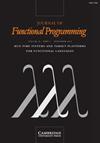使用Coq证明助手对递归程序进行推理的折叠展开引理
IF 1.1
3区 计算机科学
Q4 COMPUTER SCIENCE, SOFTWARE ENGINEERING
引用次数: 0
摘要
折叠展开引理补充了Coq证明助手中的重写策略来对递归函数进行推理,无论递归函数是局部定义还是全局定义。每个结构用例都会产生一个折叠展开引理,该引理将这种情况下对该函数的调用等同于相应的用例分支。因此,它们是“样板”,可以机械地生成,尽管手工陈述它们对于初学者来说是一种学习体验,更不用说解释它们了。他们的证明是通用的。它们的使用是精确的(例如,在多个调用方面),并且它们可以无缝地扩展(例如,延续传递风格和各种递归模式),可以是等式或关系推理。根据笔者的经验,这些方法在课堂上是有效的,考虑到在随后的学期报告和口试中话语的清晰性;在课堂之外,考虑到在继续与Coq Proof Assistant合作时的后续使用。折叠展开引理也提供了一种理解和控制的方法,当一个人使用快捷方式时,也就是自动简化策略。从8.0版本开始,函数归纳插件为全局定义的函数(即递归方程)提供了它们,现在的equations插件也提供了它们,无论是全局声明还是局部声明,这对高级用户来说都是宝贵的帮助。本文章由计算机程序翻译,如有差异,请以英文原文为准。
Fold–unfold lemmas for reasoning about recursive programs using the Coq proof assistant
Abstract Fold–unfold lemmas complement the rewrite tactic in the Coq Proof Assistant to reason about recursive functions, be they defined locally or globally. Each of the structural cases gives rise to a fold–unfold lemma that equates a call to this function in that case with the corresponding case branch. As such, they are “boilerplate” and can be generated mechanically, though stating them by hand is a learning experience for a beginner, to say nothing about explaining them. Their proof is generic. Their use is precise (e.g., in terms with multiple calls) and they scale seamlessly (e.g., to continuation-passing style and to various patterns of recursion), be the reasoning equational or relational. In the author’s experience, they prove effective in the classroom, considering the clarity of discourse in the subsequent term reports and oral exams, and beyond the classroom, considering their subsequent use when continuing to work with the Coq Proof Assistant. Fold–unfold lemmas also provide a measure of understanding as well as of control about what is cut short when one uses a shortcut, i.e., an automated simplification tactic. Since Version 8.0, the functional-induction plugin provides them for functions that are defined globally, i.e., recursive equations, and so does the Equations plugin now, both for global and for local declarations, a precious help for advanced users.
求助全文
通过发布文献求助,成功后即可免费获取论文全文。
去求助
来源期刊

Journal of Functional Programming
工程技术-计算机:软件工程
CiteScore
1.70
自引率
0.00%
发文量
9
审稿时长
>12 weeks
期刊介绍:
Journal of Functional Programming is the only journal devoted solely to the design, implementation, and application of functional programming languages, spanning the range from mathematical theory to industrial practice. Topics covered include functional languages and extensions, implementation techniques, reasoning and proof, program transformation and synthesis, type systems, type theory, language-based security, memory management, parallelism and applications. The journal is of interest to computer scientists, software engineers, programming language researchers and mathematicians interested in the logical foundations of programming.
 求助内容:
求助内容: 应助结果提醒方式:
应助结果提醒方式:


